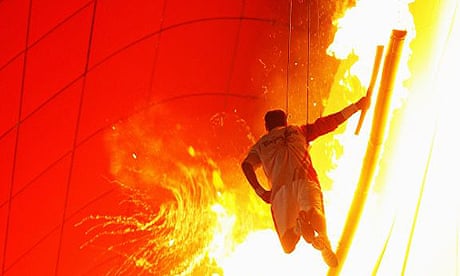Somewhere among the 91,000 presidents, princes and punters sweltering inside the Bird's Nest last night was a small delegation from London who, at the end of the dazzling statement of intent with which Beijing marked the start of its Olympics, could have been forgiven for shifting uncomfortably in their seats. Unlike the rest of the audience, their discomfort will have been nothing to do with the heat.
In four years' time London will stage an opening ceremony and matching the spectacular put on here last night will be a challenge as formidable as any the city faces. The first indication of how London intends to tackle it comes in just over a fortnight when it contributes an eight-minute segment to the closing ceremony, culminating with the handover of the Olympic flag to the mayor, Boris Johnson. David Beckham, a red double-decker bus and a trio of dance troupes have been booked and Johnson has been practising waving the flag for months, but on last night's evidence he will have a tough act to follow.
From the opening crackle of fireworks that danced round the rim of the National Stadium to the lighting of the flame four hours later this was a ceremony that set new standards for pyrotechnics, acrobatics, light and sound. That it substantially raised the bar for cheesiness - a feat seasoned Olympic watchers thought impossible until Sarah Brightman stood atop a 100ft high globe and sang "You and me, from one world, forever we are family" - will bother China not a bit.
Of more concern to London will be producing a memorable ceremony without spending anything like the $100m (£52m) Beijing burned last night. Already under pressure over costs as it pours billions of pounds into the freshly dug holes in east London, organisers may be reluctant to send millions more up in smoke. China invented gunpowder and last night, as 19,884 fireworks were launched into the hazy sky they demonstrated that 1,000 years of experience goes a long way.
The most obvious difference between London and Beijing will be scale. Locog's chief executive, Paul Deighton, said this week that following China's gargantuan Olympics, he aimed to set a template for manageable, affordable and sustainable Games. Last night he said: "We are not daunted, we are really, really excited, what an inspirational show. We can't wait to get started on our welcome to London in four years' time."
China is perhaps the last nation willing or able to provide resources and political will on so massive a scale and the Olympic movement could do with the next edition proving that it does not take an authoritarian regime to make the Games succeed.
Earlier this week he observed "there is not a problem that cannot be solved by the application of more labour," and his point was reinforced last night. Around 15,000 performers were involved in the ceremony, 2008 of them in the opening minutes beating on "fou", traditional drums that flashed in time to the percussion. That set the tone for a series of tableaux evoking Chinese history, none of which involved fewer than 100 colour-coordinated dancers. Never in Olympic history have more acrobats balanced on fewer acrobats than when several hundred tumblers wearing yellow jump-suits formed a human Bird's Nest Stadium.
If London is to compete, it will take more than a national recruitment drive for Morris dancers and pearly kings, and finding a volunteer to repeat the gymnast Li Ning's gravity-defying lap on the stadium roof to light the flame may prove tricky. There is little doubt, however, that Britain has the creative talent to make an equally striking statement when the eyes of the world turn to Stratford four years hence.
London can be reassured, too, that some things will be the same regardless of the son et lumière. The athletes' parade will remain a joyous display of relative national wealth and bad clothes, one in which all teams are equal regardless of size. Come 2012, Bermuda's team will still wear shorts and Panama's their hats, and the Americans will be booed by as many people as cheer them. Britain's athletes, meanwhile, will be greeted as deliriously as the Chinese team here.
All of them, however, will smile with the deep pride that comes from being an Olympian. And, as was the case last night, the lighting of the flame over the city will be a moment of celebration and respect for what it means to the athletes, the most important performers of all.
